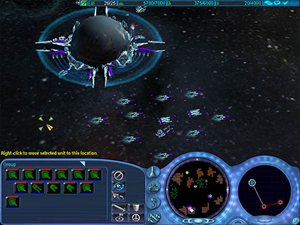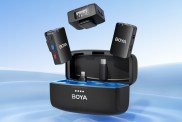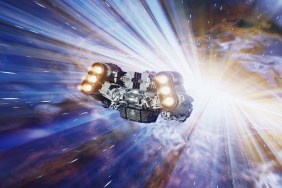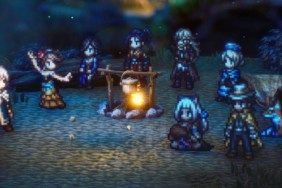As the world turns…
You buy your games. You play them in the comfort of your homes. But what do you
really know about the sordid tales of behind-the-scenes gaming intrigue? Nothing,
that’s what. Game developers and publishers are not just a bunch of happy Cheeto-munching
nerds who all get along in a magical rainbow kingdom. There are fights and problems
and people get ripped off and fired. And I’m gonna tell you all about it.
One
of these unhappy pairings was Digital Anvil and Microsoft, a marriage that would
make Roseanne
Bar and Tom Arnold look like Romeo and Juliet. And now that Microsoft has
quietly buried Digital Anvil in a shallow grave under the begonias, one of their
mysterious children has emerged. Its name is Conquest: Frontier Wars.
Digital Anvil was the pet project of Chris and Erin Roberts, game developers
made famous by their Wing Commander series. They began working with Microsoft
way back in 1998 when they got sackfulls of money and announced three upcoming
games. Conquest: Frontier Wars, Starlancer,
and Loose Cannon. Shortly thereafter they would also announce development
of the highly ambitious Freelancer.
Fast forward to the year 2000, when Microsoft shelled out even more cash and
simply acquired Digital Anvil altogether. They announced that they would make
an exclusive Xbox game: Brute Force. They also decided to drop Conquest,
which the developers apparently kept rebuilding from the ground up over and
over. Chris Roberts would leave the company. Later it turned out that Erin Roberts
would, too. Very mysterious.
Another year and a half goes by, and Microsoft puts arsenic in Digital Anvil’s
morning glass of orange juice and quietly tries to pretend that they never existed.
In all this time, the only game that Digital Anvil ever released was Starlancer.
So it was a great surprise to me that Conquest showed up on my desk
one morning, published by Ubisoft, and no trace of its spotty past. Honestly,
I had been looking forward to Conquest when I first saw it several years
ago. A real time strategy game with cool 3D spaceships battling for control
of star systems, it looked like what I thought Starcraft
should have been. And I was right – Conquest is what Starcraft
should have been…3 years ago when it was first released.
The parallels are unavoidable. There are three races: the Terrans (people and their toys), the Mantis (ruthless insects who grow their spaceships) and the Celareons (mysterious ancient energy beings). Sound familiar?
At least the graphics are totally different. Conquest is completely
3D and looks good. You can zoom in pretty close to even the smallest fighter
launching off a carrier ship and the graphics hold up. The large fleet battles
can get quite chaotic, with ships, lasers and missiles everywhere, but there’s
never any slowdown at all.
The sound is pretty middle-of-the-spacelane. The clamor of battle is just fine; missiles roar and lasers zap appropriately. The musical score is sort of triumphant Wagner-esqe stuff, but very repetitive. It took me only slightly longer than average to turn off the music.
To simplify the game and avoid the difficult 3D controls of Homeworld,
Conquest takes place in a Star Trek style universe where, for some implausible
reason, all the ships are on a flat plane and oriented in the same direction.
I’ll sacrifice a little realism for better gameplay any day.
The plane of the universe also contains a number of planets that you will need to house all your structures. You can also mine them for ore, gas and crew (I wonder if it’s vespine gas?) From here on out it’s classic RTS gameplay: build your units, harvest more stuff, upgrade them, order them around, and kill the enemy.
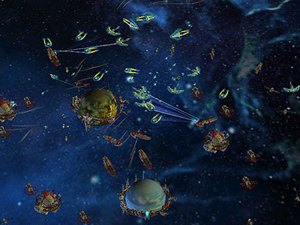 The
The
biggest innovation in the game is the use of jumpgates. Each star system has
a number of planets (usually), and is connected to other star systems by jumpgates.
These are the chokepoints that you must defend, and also the bridges by which
you must launch your invasion. Every map includes a number of star systems,
and battles can take place in multiple star systems at the same time. It’s like
playing Command & Conquer on 6 maps at once. It’s not as hard as it sounds;
you rarely have to concentrate on more than 2 systems at once, and switching
between them is easy using the handy system map.
Fortunately, your little spaceships are pretty smart. They can find their
way easily across multiple star systems without ever getting hung up like those
little Starcraft idiots. Plus, they will fire on enemies as they move
and chase them down if necessary. After years of screaming at the little units
on my screen, I found the Conquest AI very satisfying.
One frustrating thing for beginners is trying to keep your ships supplied. They run out of ammo pretty quickly and you’ll need supply ships to keep bringing them more. This gets much less frustrating as you get the hang of it and start planning ahead to have enough supplies on hand. The supply ships are pretty smart, too.
However, there are some parts of Conquest that remind you that it was
an abandoned child. The menus and the mission briefings are really dumpy; a
big surprise from Digital Anvil, who pretty much built a movie studio to go
along with their game studio, bragging that the elaborate Wing Commander
movies were only the beginning. The movies that are left are blurry. Blurry!?!?
Perhaps they had to be smuggled out.
That leaves only the game itself for entertainment, which is pretty good, but only has one campaign (albeit a long one). You play as the Terrans for a series of very long missions, getting caught in a Mantis civil war and discovering their ancient enemies, the Celareons. To really play as the Mantis or the Celareons, you will need to go online and find some organic opponents. This is fairly easy to do through Ubisoft.com, but games are limited to a maximum of 4 players.
In what must have been a drug-induced decision, Conquest comes with
a blurry starfield in the background during gameplay. I think it’s supposed
to look like space with stars and nebulae and stuff, but it looks more like
pondwater and makes the game hard to see and hard to play. Fortunately, it can
be turned off in the options. Why it was ever there, I’ll never know.
So that’s all the dirt on this abandoned half-child of Microsoft, a game that
would have been much more innovative if it hadn’t been kept locked in the attic
until Starcraft and Homeworld had already come out in various
iterations. Was Microsoft an abusive father or was Digital Anvil an overprotective,
smothering mother? We may never know, but at least Conquest turned out
OK. Next week I’ll tell you what skeletons lurk in Activision’s closet, Lara
Croft’s botched surgery, and a special feature called, “Richard Garriott: Lord
British or Lady British?”
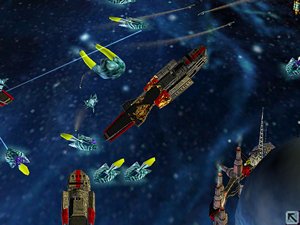
-
Good graphics
-
Cool ships
-
Smart AI
-
Supplying can be tedious
-
Dumpy front end
-
Should have come out years ago
